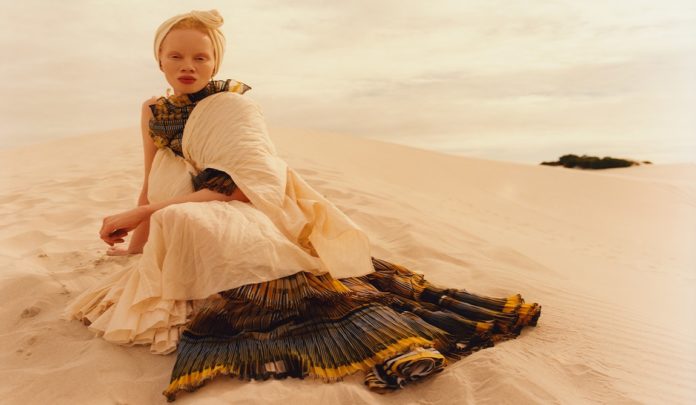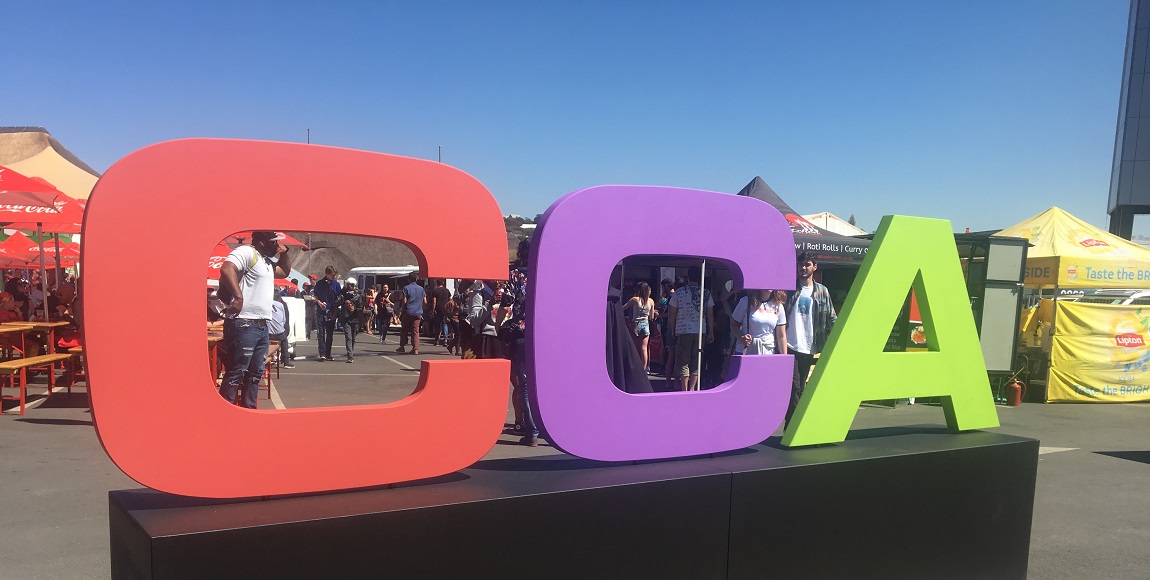AS TOLD TO
US poet Nayyirah Waheed writes, “Your beauty is a given, every being is born beautiful.” But society has twisted and warped beauty standards in a way that leaves many feeling inadequate. From this, there is a rising urgency to dispel of superficial beauty standards, and permitting us to be enough. Thando Hopa is one of those dismantling conventional beauty standards, and helping forge inclusive beauty standards.
The lawyer, model, and diversity advocate made history as the first woman living with albinism to grace the cover of Vogue. Honouring the African continent, the magazine placed the South African model on the cover of its April 2019 Portuguese edition: “African Motherland”. Hopa spoke to The Daily Vox about beauty, identity, and representation.
Defining beauty
On a generic level, I think beauty is a celebration of an image. But on a personal level, I think beauty is a state of enoughness.
The journey to “enoughness”
When I was younger, as a child, I felt absolutely beautiful. But then I entered society. I went to school and I went to play with other children. That understanding of beauty got chipped away until I got to the point where I started feeling very inadequate.
When I was in matric, I dyed my eyebrows and my eyelashes because I didn’t like that my eyebrows were so pale. I felt like I looked too different from anybody else. I decided I am going to start looking more like the people who were around me. I did that and I started feeling confident. People said, ‘Oh you look so beautiful.’ I felt like I had the formula finally.
I became quite confident, I became a prosecutor. But I didn’t realise that I only felt confident because I was garnering validation from my peers. I only felt confident when I had to use something external to make me feel like I was enough.
One day when I was doing a shoot. They asked me if I wanted to do a high fashion look, or a clean look. I asked them what a clean look was and they said, ‘We do the makeup but it keeps your authentic self, it keeps your features.’ I thought to myself, ‘Wait what?’ I realised at that point that my hesitation was because I had begun to feel afraid of how I looked without all that [makeup and styling].
When I started modelling, I wanted to represent albinism in a positive way. How do I do that if I’m afraid to show it? How do I do that if I’m afraid to show its unique characteristics like its eyebrows and eyelashes being pale, that my hair is blond and curly? None of that is black in colour. I thought to myself, ‘Okay. I’m going to learn how to love myself this way.’ I think I was about 23.
Please don’t misunderstand me: dye your hair, braid it, put eyelashes on, don’t put eyelashes on. Whatever. It doesn’t matter. It’s not about judging anybody’s beauty choice. It was about me feeling like I am enough the way I am and being able to represent and show that to the world. It was quite a process and it was not an easy one.
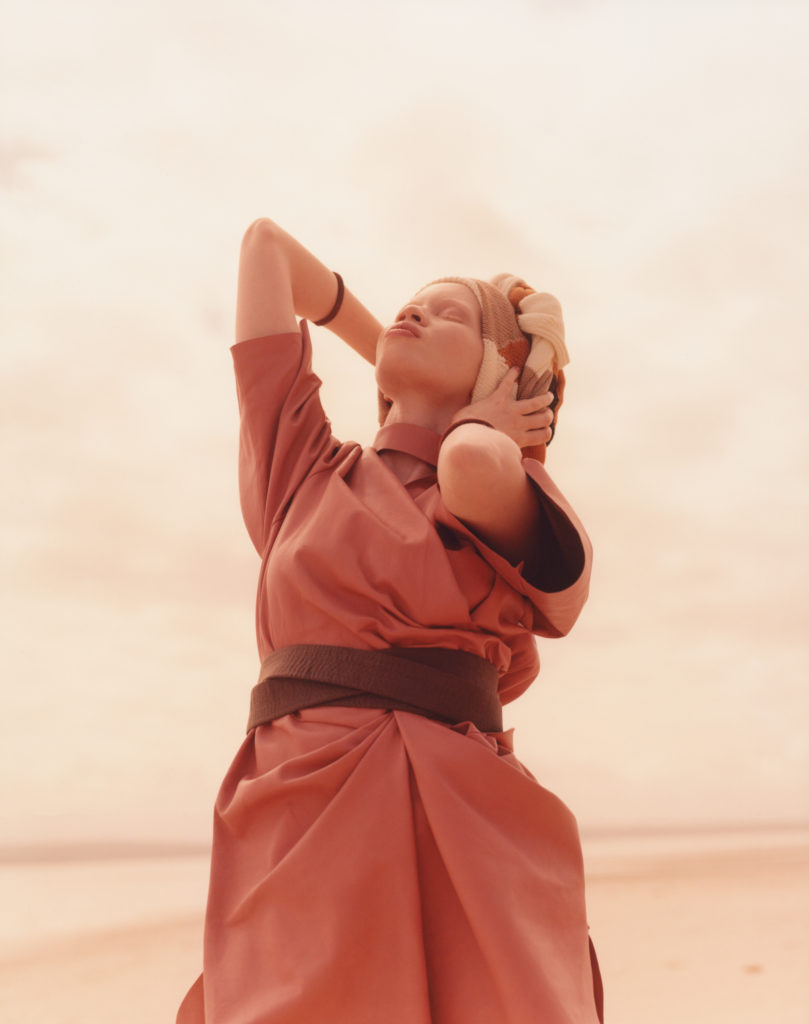
“We are enough”
It’s sad that some people never find themselves beautiful. We need to ask ourselves: What kind of cultural environment have we created where women feel like they have to change themselves to suit a look that says they are worthy of celebration?
It’s really what we teach. When we’re in media platforms, we have to understand what we’re contributing to this culture. Are we unlearning something toxic or are we accomplices? Do we say, ‘You’re not beautiful if you don’t you don’t have a conventional beauty look?’
We are worthy of being adored, we are worthy of being desired.
On firsts: the first black South African woman, and first person with albinism on Vogue
Firsts are markers of progress so they’re important to note because we understand when the tide began to turn. But it also shows the misfortune of how long people were invisible, how long people went without seeing themselves in platforms that inform our culture. It’s a bittersweet feeling.
Representation is important, but it’s not that simple
Representation helps loosen beauty standards and helps turn them into beauty preferences. But it isn’t just as simple as representation. How we go about representation is important because people don’t just want to be represented. It’s also about how they are represented.
I’m a woman who went through the stages. There was a time when there was no representation and it was almost like any representation would help. When you have the representation, sometimes you’re dealing with misrepresentation and that’s not okay either. We need an inclusive kind of representation. We need to own the word ‘inclusion’ and understand what it means. You can represent different people or allow different people to have platforms in order for them to be represented but I think that’s the question of inclusivity. How do we interact with that difference?
If we don’t answer that question in a way that enhances equality then we’re still going wrong. What will happen is you will stereotype or you will create tokenism, whatever the case may be, because you aren’t being inclusive in your representation.
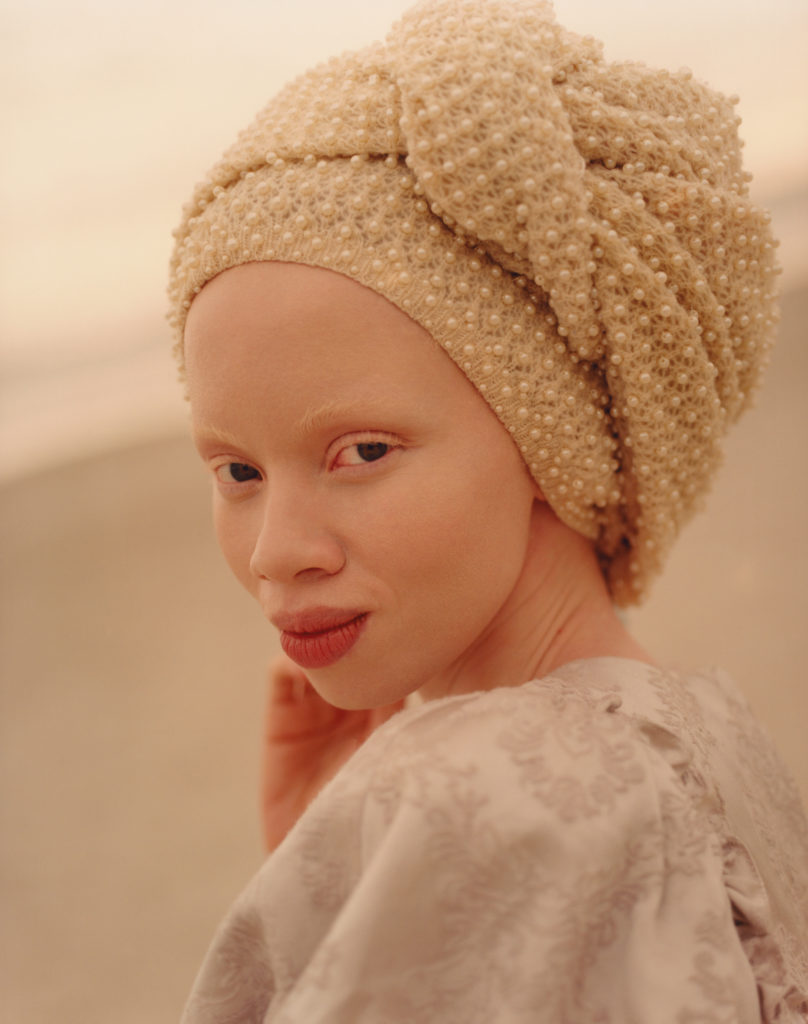
We’re carrying too many identities and that makes it difficult to navigate representation
Inclusive representation is multi-faceted. When I am in this body, I have to represent people with albinism, women, South Africans, Africans, black people… Whether you choose to acknowledge it or not, it’s just there. When you do choose to acknowledge it, then it becomes quite a catch 22. It almost feels like when you are making progress with respect to one kind of representation, another kind of representation could suffer.
For example, you are the first South African on the Vogue cover and they put animals around you and animal skins on me and say, ‘This is Africa’. A South African is on the Vogue cover, a black woman is on the Vogue cover. But as an African, the representation is a problem.
If you have a lot of identities you find that you may suffer compounded accountabilities or compounded prejudices or both. That’s the difficulty. We’re carrying too many identities and if you carry too many identities, marginalised identities, it becomes far more difficult to navigate representation. You have to think about women, black people, Africans, people with albinism. This is a lot.
“I’ve made my mistakes, I speak my truth”
I’ve made my mistakes. I look back and think, ‘Ugh, in retrospect I shouldn’t have done that.` But I’ve learned to be more compassionate with the set of circumstances I have to deal with. The circumstances are not always going to be conducive. You have to understand that changing even one thing helps, that there is time, and the other stuff will follow. That’s the best way to do it. If you are always conscious of the multiple identities that you have, and the marginalisation within those identities you may actually end up doing nothing.
I speak my truth. Most of the time I say, ‘I understand what you are trying to do but this is the harm it could cause.’ A lot of the time, people don’t have that perspective. They don’t know they’re doing something wrong. People are so embedded in their prejudices, they don’t even see it playing out. I, myself, am not immune from prejudice. When somebody highlights that what you’re doing is causing far more harm than good, if you are genuine in wanting to change something then you will change it. People have the right rhetoric but it depends on how they go about that rhetoric.
It will tell you the kind of partners that you’re working with. If they act in a manner that is inclusive, then you know these people are genuine about change. If they don’t, and you feel like you are deliberately silenced or dismissed, then you understand that it’s just for show. It is also important for you to speak your truth where you can. It can be quite a complex situation when you’re dealing with power dynamics.
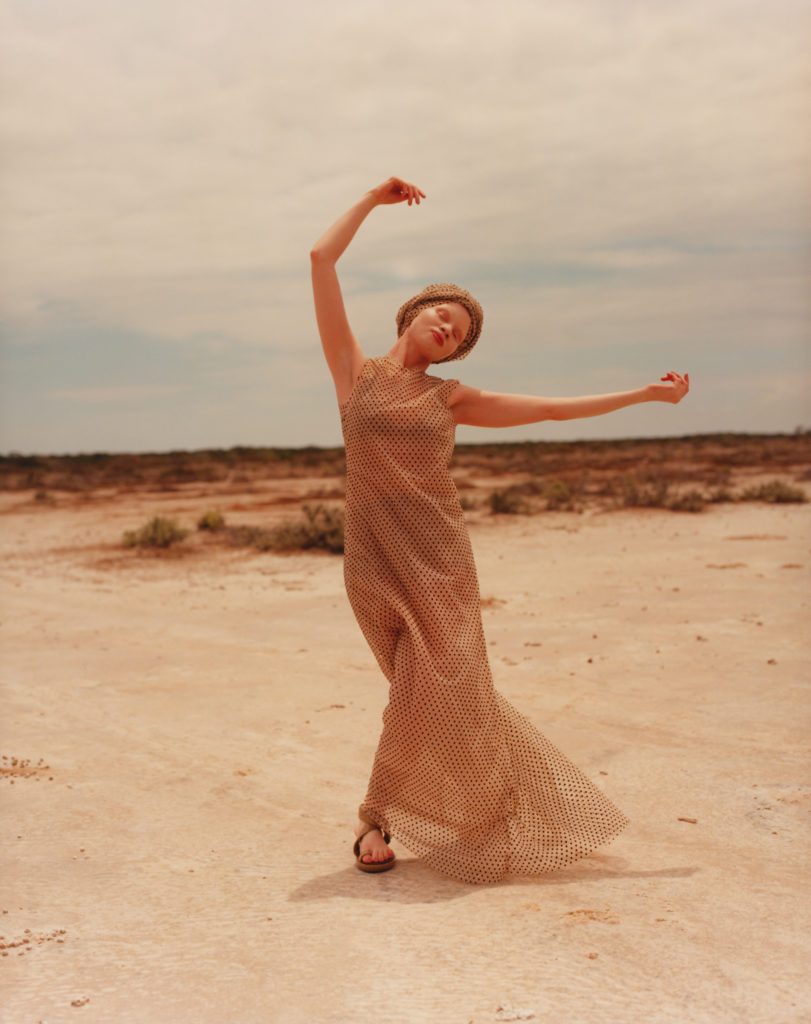
The future for Thando Hopa
A lot of things are opening up that I never thought of. But my love has always been film. I don’t know if it’s a love or whether I would like to prove a point. In terms of film and television, albinism was the most not humanised part of my identity. Women fought for their rights, black people fought for their rights, I am both these things. But in terms of albinism, there is still so much of the stereotype. Either albinism is portrayed as evil, or some kind of superstition is attached to it, or some kind of prejudice. It’s always the same storyline. I would like to be more involved in storylines that don’t burden the body of albinism to a stereotype.
But I do think that’s something that seems to be in my path…
Follow Hopa on Instagram @thandohopa

